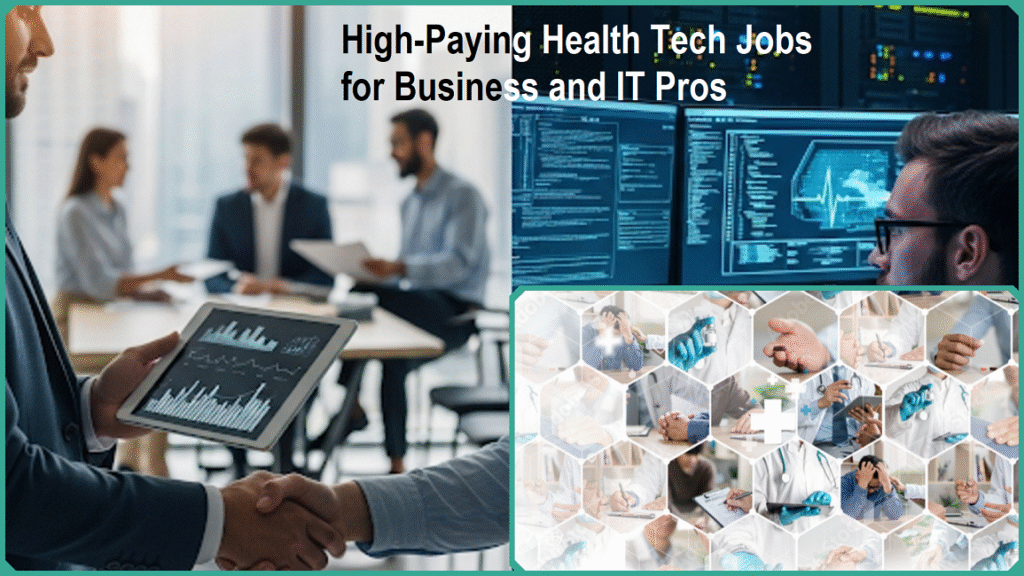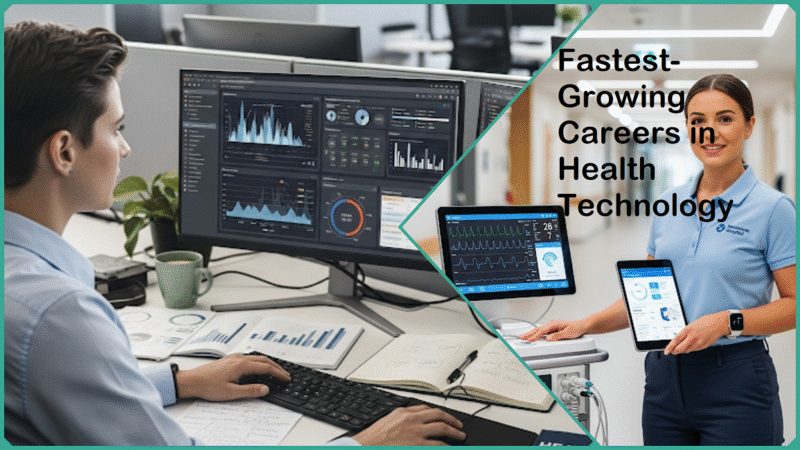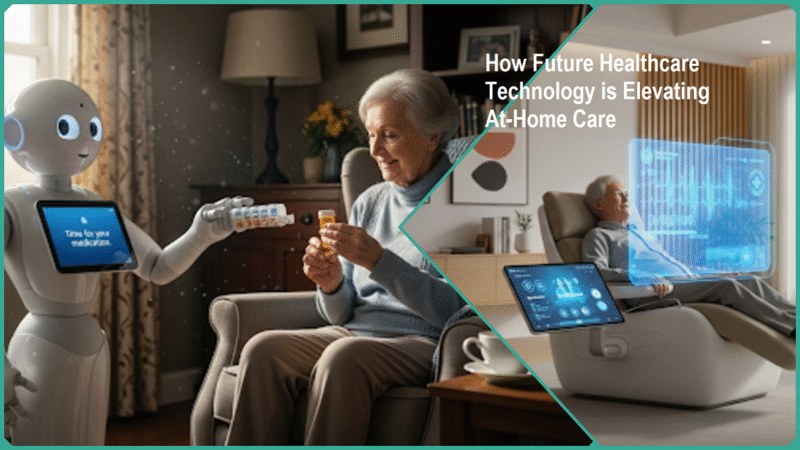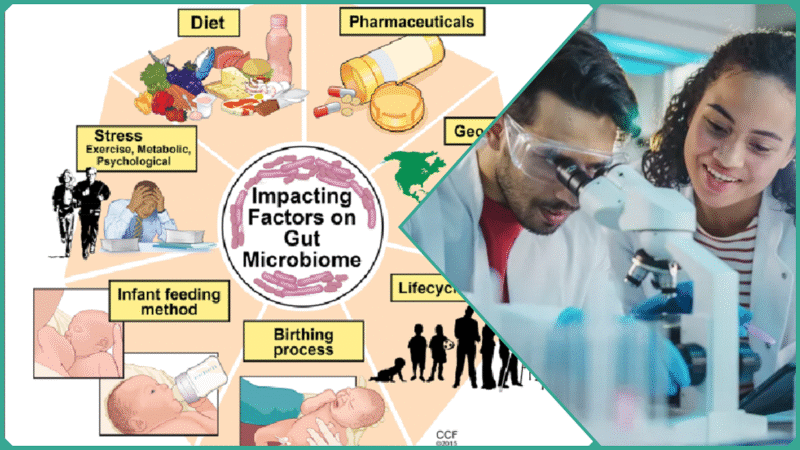Top 9 High-Paying Health Tech Jobs for Business and IT Pros
Estimated reading time: 21 minutes
The health tech industry is one of the fastest-growing and most lucrative sectors today, combining the innovation of technology with the critical mission of healthcare. For career changers with backgrounds in business or IT, the healthcare technology field presents an exciting opportunity to leverage existing skills for meaningful, well-paying positions.
This blog post acts as a comprehensive and detailed roadmap specifically designed for professionals who are eager to transition into health tech roles. These roles not only provide a stable and reliable source of financial security but also offer significant opportunities for sustained and long-term career growth and development within the evolving healthcare technology sector.

In this post, we’ll explore the top nine high-paying health tech jobs tailored for business and IT professionals. Whether you’re motivated by financial advancement, eager to apply your transferable skills, or researching industry trends for a smart career move, this guide offers data-driven insights, expert perspectives, and practical next steps. Understanding these roles will empower you to validate your career pivot and confidently step into a future where technology and healthcare intersect to improve lives.
What is Health Tech?
Health Tech, which is an abbreviation for health technology, refers to the use and integration of information technology, advanced software, data analytics, and engineering solutions that are specifically created to enhance healthcare delivery and improve patient outcomes.
This field covers a wide and diverse range of tools and technological advancements, spanning from conventional medical devices that have been used for decades to the latest, state-of-the-art innovations such as artificial intelligence (AI) and machine learning algorithms. These technologies collectively contribute to transforming the healthcare landscape by making it more efficient, accurate, and accessible.
More precisely, health technology encompasses a wide range of tools, equipment, and systems designed to improve medical care, enhance patient outcomes, and streamline healthcare delivery. This includes not only devices and machinery but also software applications, diagnostic equipment, treatment methods, and health information systems that support the overall healthcare infrastructure.
Digital Health
This area encompasses a broad range of software solutions and digital tools, including electronic health records (EHRs), telemedicine platforms, mobile health applications, and patient portals. These technologies work together to enhance and streamline communication and management within the healthcare system, making it easier for providers and patients to interact efficiently and securely.
By thoughtfully integrating these advanced digital resources into healthcare systems, the delivery of medical services becomes significantly more coordinated, easily accessible, and highly effective. This enhanced integration facilitates better communication among healthcare providers, streamlines patient management, and ensures timely access to critical information.
As a result, patient outcomes are significantly and noticeably improved, leading to a much better overall healthcare experience that becomes more positive, efficient, and thoroughly patient-centered. This enhanced approach benefits not only the individuals receiving care but also the healthcare professionals providing it, creating a more supportive and effective environment for everyone involved.
Medical Devices
These are highly specialized instruments and sophisticated pieces of equipment, including MRI scanners, advanced wearable health trackers, remote patient monitoring devices, and cutting-edge surgical robotics, all of which play an essential and crucial role in assisting healthcare professionals.
They contribute significantly to achieving accurate diagnosis, delivering effective treatment, and ensuring comprehensive patient care throughout the numerous and varied stages of medical intervention and recovery processes.
Health Information Technology (HIT)
This branch primarily focuses on the comprehensive management of healthcare information through electronic means. It encompasses the processes involved in the storage, retrieval, sharing, and secure exchange of health-related data.
This exchange takes place among a diverse group of parties, including patients, healthcare providers, insurance payers, and numerous other important stakeholders who play key roles within the broader healthcare ecosystem.
The goal of health tech is to make healthcare more efficient, personalized, accessible, and cost-effective. It empowers patients by giving them better control and insight into their health data and supports healthcare providers by improving clinical workflows, diagnostic accuracy, and care coordination.
In Summary
Health technology stands as a powerful and transformative force in the field of healthcare by effectively leveraging a wide range of organized knowledge and specialized skills. This is achieved through the innovative use of various devices, advanced software applications, carefully designed procedures, and integrated systems.
Together, these elements work harmoniously and synergistically to effectively address a wide range of complex health problems, enhance the quality and delivery of patient care, and significantly improve the overall quality of life for individuals across diverse and varied populations. This collaborative approach ensures comprehensive solutions that benefit everyone involved.
Why Business and IT Pros?
Healthcare today increasingly depends on advanced digital systems and highly efficient business processes to provide high-quality care to patients, which naturally positions business and IT professionals as ideal candidates for various roles within the health technology sector.
Here’s a closer look at why individuals with backgrounds in business and IT tend to excel and thrive in the field of health technology:
- High Transferability of Skills: Business and IT pros bring valuable, transferable skills such as IT infrastructure management, cybersecurity, data analysis, project management, and strategic business operations. These skills are highly relevant as healthcare organizations adopt and maintain complex digital systems like electronic health records (EHRs), telehealth platforms, and data analytics tools.
- Technical Proficiency Meets Healthcare Needs: Healthcare IT demands strong technical knowledge in areas like networking, database management, programming (e.g., SQL, Python), and familiarity with healthcare-specific software platforms. IT pros often have these technical foundations, enabling them to adapt rapidly to healthcare technologies.
- Understanding of Regulatory and Security Requirements: Business and IT pros usually have experience navigating compliance and regulatory landscapes, which is critical in healthcare due to strict rules like HIPAA protecting patient privacy. Their cybersecurity knowledge helps ensure the security and confidentiality of sensitive health data.
- Data-Driven Decision Making: Health tech leverages vast amounts of clinical and operational data. Professionals skilled in data management and analytics can turn raw healthcare data into actionable insights that improve patient outcomes and operational efficiency.
- Project and Change Management Expertise: Business and IT professionals often have experience managing complex projects and coordinating across multiple teams. This is vital in healthcare settings where the implementation of new technologies requires collaboration between clinicians, administrators, and IT specialists.
- Strong Communication and Interpersonal Skills: Bridging the gap between technical teams and clinical staff requires clear communication. Business and IT pros with the ability to translate technical concepts into healthcare terms and vice versa support smoother technology adoption and use.
- Adaptability to Technological Evolution: Healthcare technology is rapidly evolving, from AI-enabled diagnostics to IoT medical devices. IT and business professionals are typically accustomed to fast-paced technological changes and continuous learning, preparing them well for this environment.
In summary
Business and IT professionals are highly sought after in the health tech industry because they combine strong technical expertise with strategic business acumen, a deep understanding of regulatory requirements, and excellent communication skills.
This unique blend makes them exceptionally well-equipped to lead and accelerate the digital transformation of healthcare systems. By leveraging their comprehensive knowledge and abilities, they play a critical role in enhancing patient care, streamlining healthcare processes, and fostering innovation within the medical and technological fields.
Current Trends and Developments in Health Tech
Current health tech trends and developments increasingly emphasize the rapid and growing integration of advanced technologies along with sophisticated data-driven approaches aimed at significantly improving healthcare delivery, operational efficiency, and overall patient outcomes.
Below is a comprehensive overview of these key trends and innovations that are shaping the future of healthcare, reflecting the most up-to-date insights and projections for the year 2025:
Surge in Data-Driven Healthcare
The explosion of electronic health data requires specialists skilled in managing, securing, and analyzing this information. Real-time analytics are becoming mainstream, enabling immediate clinical decisions from live patient data, such as ICU monitors alerting to patient deterioration in advance.
Predictive analytics are widely used to forecast disease progression, optimize resource allocation, and tailor personalized treatment plans based on genetic and lifestyle data. The shift towards value-based care is driven by analytics that focus on patient outcomes over service volume, benefiting population health management and cost-efficiency.
Additionally, the Internet of Medical Things (IoMT), including wearables and remote monitoring devices, produces vast real-time datasets that enhance continuous patient care and early detection of health issues. Cloud computing and edge analytics infrastructures support scalable, secure, and low-latency processing of these massive data streams.
Strong data governance ensures privacy, interoperability, and compliance with regulations like HIPAA. Healthcare data analytics is expected to grow significantly, fueled by AI integration that supports diagnostic accuracy, operational efficiency, and personalized medicine.
Advancements in Medical Devices
Medical device engineering is rapidly innovating by embedding AI, robotics, and IoT capabilities. These devices provide enhanced diagnostic precision, autonomous operation, and remote patient monitoring. The growing market for connected devices (IoMT) is projected to double in size in the coming years, highlighting the critical role of engineering expertise and regulatory compliance skills.
Technologies like augmented reality (AR), virtual reality (VR), and digital twins (virtual models of healthcare environments and biological systems) offer new ways to visualize and interact with medical data and train practitioners safely.
Growth in Telehealth
The COVID-19 pandemic accelerated the widespread adoption of telehealth services, a transformation that continues to evolve. The telehealth ecosystem now requires sophisticated IT infrastructure with robust cloud computing platforms for scalable service delivery, enhanced cybersecurity to protect sensitive health data, and user-centered design to improve patient and provider experiences.
Telehealth coordinators and IT specialists play a crucial and indispensable role in managing these advanced systems, ensuring their smooth and seamless integration with the existing healthcare workflows and processes. Their expertise is vital in coordinating between different departments and technology platforms to create an efficient, user-friendly telehealth environment that supports both healthcare providers and patients effectively.
AI and Machine Learning in Healthcare
AI and machine learning technologies are revolutionizing healthcare by automating complex tasks, improving diagnostics, and facilitating predictive analytics. AI systems can analyze medical imaging with superhuman accuracy, detect subtle abnormalities, and assist in the early detection of diseases such as cancer and cardiovascular conditions.
AI-driven multidisciplinary teams break down silos between medical specialties, enabling comprehensive treatment plans. Generative AI and human-AI collaboration models are enhancing decision-making while maintaining human oversight for safety and accountability. Governance frameworks for AI, like the EU AI Act, impose strict standards for transparency and bias mitigation.
Regulatory Focus and Compliance
As health tech adoption grows, stringent regulatory requirements ensure the protection of patient data and the safety and efficacy of healthcare technologies. Compliance with laws such as HIPAA (USA) and frameworks like the EU Artificial Intelligence Act are central to operations.
Privacy-first analytics practices, including anonymization, federated learning, and blockchain, are increasingly employed to secure sensitive information while enabling data-driven research and care. Healthcare organizations prioritize robust data governance and ethical AI deployment to maintain trust and legal compliance.
In Summary
Health technology in 2025 is defined by a highly integrated and interconnected ecosystem where advanced data analytics, cutting-edge medical devices, the rapid expansion of telehealth services, AI-driven healthcare solutions, and stringent regulatory compliance work together seamlessly to revolutionize the delivery of healthcare.
These emerging trends are driving a significant increase in demand for skilled professionals who possess a unique combination of expertise spanning information technology, data science, engineering disciplines, project management, and an in-depth understanding of healthcare regulations and policies. This multidisciplinary approach is essential to successfully navigate and contribute to the evolving health tech landscape.
Top High-Paying Health Tech Jobs for Business and IT Professionals
Here is a carefully refined and well-organized summary of the top 9 highest-paying health tech jobs specifically tailored for business and IT professionals, including up-to-date salary ranges, essential skills required, and detailed explanations of why each role is an excellent fit for professionals interested in pivoting or transitioning their careers into the rapidly growing field of health technology:
| Job Title | Average Salary Range (USD) | Key Skills & Qualifications | Why It Fits Business & IT Pros |
|---|---|---|---|
| Health Informatics Specialist | $70,000 – $110,000 | Data management, healthcare IT systems, communication, analytics | Combines IT knowledge with healthcare data systems, excellent for data-savvy professionals who liaise among stakeholders. |
| Clinical Informatics Manager | Around $106,000 | Project management, clinical systems expertise, compliance, leadership | Ideal for those with business management and clinical IT expertise, overseeing strategic health IT implementations. |
| Health Data Scientist | $95,000 – $140,000 | Statistical analysis, machine learning, and programming skills | Fits IT pros with data science skills tackling healthcare challenges through AI and analytics. |
| Medical Device Engineer | $75,000 – $130,000 | Biomedical engineering, product development, regulatory compliance | Suited for engineers interested in developing innovative medical devices incorporating tech advancements. |
| Medical or Health Services Manager | Around $117,000 | Healthcare administration, operations management, budgeting, policy compliance | Attracts professionals with strong business acumen in managing healthcare operations efficiently. |
| Health IT Project Manager | $90,000 – $130,000 | Project management, IT systems expertise, stakeholder engagement | Perfect for IT and business pros managing health tech projects that align tech with business goals. |
| Health Cybersecurity Specialist | $90,000 – $135,000 | Network security, risk management, and regulatory compliance | Leverages cybersecurity and compliance skills to protect sensitive health data in digital healthcare environments. |
| Telehealth Coordinator | $75,000 – $105,000 | Communication, IT infrastructure, and healthcare delivery knowledge | Manages telehealth systems, ensuring efficient tech use and seamless interactions between caregivers and patients. |
| Digital Health Product Manager | $110,000 – $150,000 | Product lifecycle management, UX/UI design, regulatory knowledge | Bridges technology, business strategy, and healthcare regulations to lead digital product development and market success. |
These roles clearly illustrate the wide range of diverse and exciting opportunities that are available for IT and business professionals, enabling them to effectively leverage their specialized skills and expertise. This takes place within a high-demand, rapidly growing, and financially rewarding sector of the economy, which continues to expand and evolve at an impressive pace.
Such opportunities not only provide valuable career growth and development but also present a unique chance to make meaningful contributions to the technological advancements that are actively shaping and transforming the future of numerous industries across the globe.
Transferable Skills That Accelerate Your Health Tech Career Change
Let’s focus on the valuable skills you’ve gained from your business and IT career that are in high demand within the health tech industry. You’ll discover how to identify and showcase abilities such as project management, data analysis, and strategic thinking to accelerate and enhance your career transition.
We’ll guide you on how to present your existing experience as a key strength, turning it into a powerful asset when pursuing opportunities in health tech. Transferable Skills That Accelerate Your Health Tech Career Change
Data Management & Analytics
- Why It Matters: Health tech relies heavily on data from numerous sources — electronic health records (EHRs), medical devices, wearables, and more. Organizing, validating, and interpreting this data correctly is essential for improving patient care, optimizing operations, and enabling research.
- Transferable Aspects: If you have experience handling large datasets, building dashboards, performing statistical analysis, or using data visualization tools (like Tableau, Power BI), these skills translate directly to managing healthcare data.
- In Health Tech: You’ll often work with clinical data standards (like HL7, FHIR) and healthcare databases, requiring an understanding of sensitive patient information and data privacy regulations.
Project Management
- Why It Matters: Implementing or upgrading health IT systems (like EHRs, telehealth platforms) involves complex projects that impact many stakeholders, including clinicians, IT departments, and administration.
- Transferable Aspects: Experience with planning, risk management, resource allocation, and leading cross-functional teams will help you navigate healthcare projects effectively.
- In Health Tech: You may also manage vendor relationships, user training, compliance deadlines, and ensure solutions meet regulatory requirements, requiring adaptable and empathetic leadership qualities.
Regulatory Knowledge
- Why It Matters: Healthcare is one of the most regulated industries. Ensuring that digital tools and procedures meet legal standards protects patient rights and organizational liability.
- Transferable Aspects: Familiarity with regulatory frameworks such as GDPR (if experienced in Europe), HIPAA (in the US), ISO standards, or other compliance regimes provides a strong foundation.
- In Health Tech: You will typically learn healthcare-specific regulations on privacy (HIPAA), medical device approvals (FDA or CE marking), and data security, which are critical when developing or managing health tech solutions.
Communication
- Why It Matters: Health technology projects often require collaboration across diverse teams — clinicians who understand patient care, IT specialists who manage systems, and business leaders who set strategy.
- Transferable Aspects: Your ability to translate technical jargon into clear, understandable information for non-technical stakeholders or vice versa is invaluable.
- In Health Tech: Effective communication ensures that technology solutions align with clinical workflows and patient care goals, enhancing user adoption and project success.
Systems Integration
- Why It Matters: Healthcare environments use multiple interacting systems (EHRs, billing, lab information, imaging, telehealth), and seamless interoperability improves efficiency and patient outcomes.
- Transferable Aspects: Experience with software integration, APIs, middleware, and troubleshooting system compatibility will help you coordinate these complex technology landscapes.
- In Health Tech: Integration requires knowledge of healthcare data standards and security protocols to ensure safe and efficient exchange of clinical information across platforms.
Additional Tips to Leverage These Skills in Health Tech:
- Highlight Relevant Experience: When making a career switch, it is especially important to emphasize projects where you have actively collaborated with cross-functional teams, managed or handled sensitive data with care, or made meaningful contributions to compliance and regulatory efforts. These experiences demonstrate your ability to work across different departments, maintain confidentiality, and adhere to important industry standards, which can significantly strengthen your candidacy in a new field.
- Use Targeted Certifications: Obtaining specialized courses or certifications in areas such as healthcare informatics, project management (including widely recognized credentials like PMP), health IT security, and regulatory affairs can significantly enhance your professional profile and validate your skills to potential employers in a competitive job market. These targeted certifications demonstrate your commitment to staying current with industry standards and best practices, making you a more attractive candidate for various roles within the healthcare and technology sectors.
- Gain Healthcare Exposure: Develop a comprehensive understanding of basic clinical workflows, familiarize yourself with essential healthcare terminology, and explore the various challenges faced in patient care. This deeper insight will significantly enrich your ability to apply your skills effectively in real-world healthcare settings.
By effectively and skillfully communicating how these valuable transferable skills directly address and solve healthcare’s unique and complex challenges, you significantly accelerate your smooth transition into a fulfilling, rewarding, and well-paying career within the rapidly growing health tech industry.
How to Prepare for These Roles
To prepare effectively and confidently for high-paying health tech roles as a business or IT professional who is aiming to pivot and transition into this rapidly evolving sector, here are the essential key steps and practical recommendations based on the most current educational strategies and career development trends observed in 2025:
Education
- Certifications and Degrees: Obtaining specialized credentials can significantly boost your profile. Consider degrees or certifications in: Health Informatics, Data Science, Healthcare Administration, and Health Information Technology. Most health tech roles today require at least a bachelor’s degree, with many professionals gaining a master’s degree or relevant certifications to stand out. For instance:
- Bachelor’s programs cover medical terminology, IT fundamentals, data management, and healthcare statistics.
- Master’s programs dive deeper into healthcare data analytics, IT project management, and regulatory compliance.
- Certification Examples:
- Certified Health Data Analyst (CHDA)
- Certification in Healthcare Privacy and Security (CHPS)
- Associate in Healthcare Information & Management Systems (CAHIMS)
- Project Management Professional (PMP) for health IT project managers
- Background Clearances and Health Requirements: Some programs or roles require background checks, immunizations, and sometimes health exams due to clinical rotations or access to patient data.
Training Programs
- Specialized Training: Many institutions, including universities and online platforms, offer targeted health tech training bridging IT/business and healthcare. These may include hands-on labs with electronic health records (EHRs), coding for health applications, understanding AI in healthcare, and telehealth technologies.
- Continuous Learning: Given the rapid evolution in the field, ongoing education through webinars, workshops, and online courses is essential to stay updated with trends such as AI, data privacy regulations, and emerging medical devices.
Networking
- Join Health Tech Communities: Participate in health tech forums, professional groups on LinkedIn, and organizations such as the Healthcare Information and Management Systems Society (HIMSS).
- Attend Conferences and Events: Industry events provide opportunities to learn about the latest innovations and connect with healthcare professionals, recruiters, and thought leaders.
- Engage with Healthcare Organizations: Volunteering or collaborating with hospitals, tech startups in healthcare, or research institutions can provide valuable exposure and contacts.
Hands-On Experience
- Internships and Volunteer Roles: Seek internships, apprenticeships, or volunteer positions focused on health technology systems. Practical experience with EHRs, telehealth platforms, or health data projects is highly valuable.
- Project Involvement: If currently employed, look for opportunities to work on health tech-related projects, such as digital transformation initiatives, health data analytics tasks, or IT infrastructure upgrades for healthcare clients.
- Military or Specialized Training: Certain candidates gain unique hands-on experience through military medical training programs or government healthcare service roles.
In Summary
Preparing for a successful career in health tech as either a business professional or an IT expert should place a strong emphasis on formal education, which includes obtaining relevant degrees and industry-recognized certifications. This foundational knowledge should be further enhanced with specialized training programs and a commitment to continuous learning to stay current with the latest advancements.
Additionally, actively engaging in networking opportunities and gaining hands-on experience through internships, projects, or real-world applications are equally important. These practical experiences not only help build credibility but also develop essential skills needed to thrive in the rapidly evolving and dynamic health technology sector.
FAQs
What background do I need to transition into health tech from IT/business?
A strong foundation in IT or business operations is essential. This includes skills in data analysis, project management, cybersecurity, and strategic business processes. Adding some healthcare knowledge—either through self-study, certification, or formal education in health informatics, healthcare administration, or related fields—greatly enhances your profile. Certifications such as health informatics, project management (PMP), or healthcare privacy and security (CHPS) can boost your qualifications and credibility.
Are these jobs limited to tech companies or hospitals?
Opportunities exist across a wide range of organizations, including hospitals, health systems, medical device manufacturers, pharmaceutical and biotech companies, insurance companies, digital health startups, and consulting firms specializing in healthcare technology.
How much can I expect to earn starting out?
Entry-level salaries typically start around $70,000 per year. Experienced professionals with specialized skills, certifications, or advanced degrees can earn well over $100,000 annually. Salaries vary based on role, location, and employer, but health tech roles generally offer competitive compensation reflecting the sector’s high demand.
Is healthcare experience necessary?
Healthcare experience is not always required. Many roles prioritize your IT or business expertise first. Healthcare knowledge can often be learned on the job or gained through targeted programs and certifications. However, understanding healthcare workflows, regulations, and terminology does improve your ability to succeed and advance in these roles.
What’s the job outlook for health tech careers?
Health tech is a rapidly growing field, with job growth expected in the range of 15-20% over the next decade. The digital transformation of healthcare through electronic health records, AI, telehealth, medical IoT devices, and data analytics drives strong demand for professionals combining tech and business skills with healthcare understanding.
These insights reflect current career transition trends and job market data in 2025, underscoring that a strategic blend of business/IT skills and healthcare knowledge opens many high-paying, in-demand career paths in health tech. If you’d like, I can suggest specific certifications, training resources, or next steps tailored to your background to maximize your transition success.
In Conclusion
Health tech provides a highly rewarding career pathway for business and IT professionals seeking financial growth and meaningful impact in a burgeoning field. The nine highlighted roles—from health informatics specialist and data scientist to product manager and cybersecurity specialist—illustrate the variety of high-paying opportunities that leverage your existing skills while offering career advancement and job security.
To prepare effectively:
- Deepen your healthcare knowledge and data skills by enrolling in specialized courses and certifications in health informatics, healthcare data science, regulatory compliance, and healthcare administration. These positions you as a competitive candidate ready to meet industry demands.
- Consider leadership training programs to boost your prospects for managerial roles such as clinical informatics manager or health services manager, which combine strategic business acumen with healthcare IT expertise.
- Engage actively with healthcare technology communities and networks to stay current with trends, build relationships, and find hands-on experiences like internships or volunteer projects that enhance your practical skills.
With dedicated and focused preparation combined with effectively leveraging your existing transferable business and IT skills, you can confidently make a successful transition into the health tech industry, a dynamic and rapidly evolving field that is poised for sustained growth, continuous innovation, and exciting new opportunities.
If you are ready to advance your transition, downloading a comprehensive Career Guide specifically designed for business and IT professionals entering health tech can provide expert tips, curated resources, and a clear action plan tailored to your goals.
Discover more from Skill to Grow
Subscribe to get the latest posts sent to your email.




